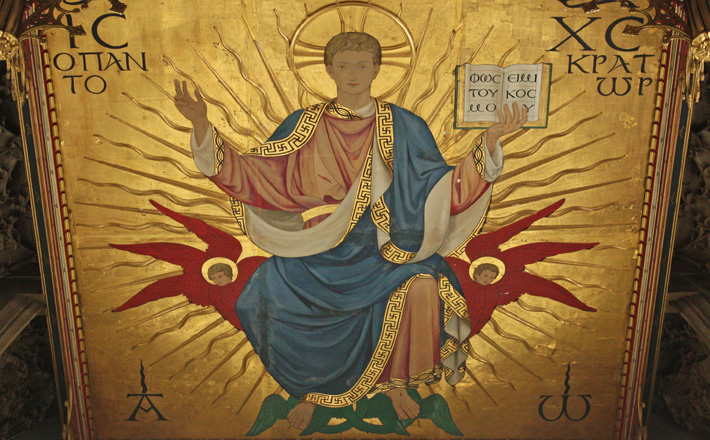Commentary on Ephesians 1:11-23
A quick overview of the letter to the Ephesians reveals an overarching focus on the church: the saints who are the body of Christ.
. From the opening greeting identifying the addressees as the saints (Ephesians 1:1-2) and the lofty opening sentences outlining the rich spiritual blessings the saints have in Christ (Ephesians 1:3-10), the letter seeks to inform its readership of the purpose for life, the promises of a new life, and the power for living believers have in Christ. Having been chosen and adopted in the Elect (1:4-5), believers now share in the privileges (chapters 1-3) and responsibilities (chapters 4-6) they have on account of being spiritually positioned in the heavenly places in Christ (1:3, 20; 2:6; 3:10; 6:12). In light of this heavenly foothold in Christ, and despite their earthly reality, the saints are reminded their inheritance has a purpose (1:11-12) and a seal of promise (1:13-14), and it rests in the power of Christ (1:15-23).
At a time when our country is facing division in light of the presidential elections and when the world increasingly lives in fear of terrorist threat, we are exhorted that our inheritance ultimately resides in Christ who has called us with a purpose (Ephesians 1:11). And, yet, God’s divine purpose for us who are saints comes with a charge to “live for the praise of his glory” (1:12, New Revised Standard Version). Although our life is hidden in Christ in the heavenly places, as saints we are called to live in this earthly habitat with the purpose of giving him praise! But, instead of thinking of this phrase merely in terms of a call to liturgical praise or a passive internal holiness, throughout this letter the Apostle Paul has in mind a life of love and unity (4:1-3): a Christ-like life of love lived for others (5:1:2). More than ever as the church, we need to strive to live as agents of reconciliation in a world filled with hate and division.
As daunting as this task might seem for us who are called to be saints, we are also reminded that this calling is an accomplishable mission because we “were marked with the seal of the promised Holy Spirit” (Ephesians 1:14). This seal of the Spirit upon the life of believers, however, should not be seen merely in terms of a marked for future delivery stamp. If Christians have been sealed from the moment of conversion, it is not to be shelved away in a storage unit until their eschatological pick-up date. This is why in the letter to the Ephesians, as well as in other epistles of the Pauline corpus, the Christian life is represented in pneumatological terms as living in the Spirit (Romans 8:4-6; Galatians 5:16; 22-25; Ephesians 5:18). In the interim period as we await our redemption, the Spirit guides us to produce fruits of justice and righteousness, which are the marks of a true Christian. It is the Spirit’s work in the believer, which marks them as “God’s own people, to the praise of his glory” (Ephesians 1:14).
Shifting toward testimony and intercession on behalf of the Ephesians, the rest of the chapter praises them and lifts a prayer for their continuance in the hope of their calling. In Paul’s mind, what makes this group of believers stand out is their faith in Jesus demonstrated by their love for all the saints (Ephesians 1:15). Indeed, the two actions go hand in hand. Linking these two verbs in a manner reminiscent of James and John the Beloved’s teachings, Paul hints love is only genuine when it is accompanied by loving actions for others. In light of this, Paul prays for God to continue giving them wisdom and revelation (Ephesians 1:17) so that they may truly come to know their hope and inheritance (verse 18). Reflecting on this, Paul is moved by wonder over God’s great power to save (verse 19) ending his prayer in a doxology, which centers on Christ’s place at the Father’s right hand (verse 20), his authority (verse 21), and relationship to the church (verses 22-23).
In the power hungry world we live in, Christ’s use and reach of his great power and authority serves as an example for the church. Although his power by far exceeds “all rule and authority and power and dominion” and his authority extends “above every name that is named, not only in this age but also in the age to come” (Ephesians 1:21), the purpose of his great power is not self-serving. Christ’s cosmic Lordship over all is not a reference to complete dominance, but rather a position of authority in the service of others. Christ has been “appointed head over all things for the church” (verse 22) indicating His great power serves the best interests of the church, which is his body. This foreshadows how later Christ’s headship over the church will be described as the love between a husband and his bride (Ephesians 5:22-33). Last, being filled by his fullness (for example his presence) the church as the body of Christ comes to participate in his position and power (verse 23). For a community in search of new identity, the Ephesian church is reminded that their place in the heavenly places ultimately rests in the power of Christ, and not their own.
Today as we remember the saints who have lived and hear the challenge to live like saints, the words of the Apostles’ Creed ring true: we believe “in the communion of the saints.” As the church of Christ, we have a purpose in this world to live for others with Christ-like love. As Christ’s bride, we have a seal of promise to be reunited with the saints of old in Christ’s eschatological reign. As the body of Christ, we are called to seek the establishment of his reign having entered it collectively through his presence in us. May God help us follow the example of Christ, modeled by the great cloud of witnesses (Hebrews 12:1), as we strive to live in unity and love through the power of the Spirit.


November 6, 2016